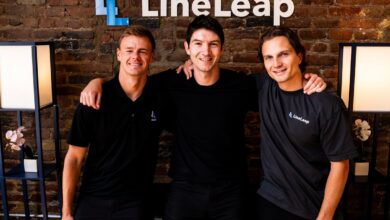Byway is using AI to help travelers slow down and take the scenic route

Solo founder Cat Jones took the plunge on setting up a travel business right around the time the pandemic was hitting Europe in March 2020. Fast forward to summer 2024 and her curated package tour business, Byway, is announcing close of an oversubscribed £5.04 million Series A round (around $6.4M at current exchange rates).
Jones’ conviction that slow and more sustainable travel — trips whose unique selling point is they’re programmed to be flight-free, going overland (and sea) by train, bus or ferry, allowing holidaymakers to take in the scenery and dodge the crowds as they unwind in more off-the-beaten-track locations — is on a roll. Growth has been 3x year-on-year, she tells TechCrunch, with more than 4,200 trips sold to date.
Environmental concerns are one major factor encouraging holidaymakers to find ways to reduce flying. Meanwhile, many popular European city-break destinations — from Amsterdam and Barcelona to Rome and Venice — and even well-known holiday islands are not as hospitable to tourists as local communities struggle with the effects of over-tourism.
Both these trends were on Jones’ mind when she was casting about for an idea to start a business after spending time working as an investor at London-based startup accelerator Founders Factory. Prior to that she spent ten years at digital adtech Unruly, ending up in its exec team as global SVP for data.
Her UK-based startup now employs 40 people. The Series A funding, led by Heartcore Capital with participation from Eka Ventures and re-investing angels, will be used to fuel expansion into new regions. The company said it plans to add more hires, including engineers to dial up investment in its proprietary artificial intelligence-based trip planner tech.
As it stands, a majority of the package holidays Byway sells (circa 60%) are booked online, which means customers are using its proprietary trip-designing software, called JourneyAI. The other 40% of sales come via a human-powered concierge service where staff talk to prospective customers to design a trip that fits their needs. But Jones is confident its holiday-planner tool will be able to take over more of the trip design work as they plug in more data sources and optimize its AI-powered recommendations.
Delightful but resilient
Jones had always been into slower and more scenic forms of travel herself, taking the ferry to Ireland to visit family and being a life-long train lover who’s never owned a car. She could thus see a real opportunity to program “gorgeous” overland holidays — with glorious scenery and exciting travel experiences, such as the thrill of a ferry crossing or mountain railway, or the slower paced novelty of sleeper trains with dining cars.
Multi-stop overland trips change the cadence of travel, and create opportunities for a different type of tourism that is less harmful to the environment vs flying. They can also spread economic benefits to more locations — alleviating pressure on tourist hotspots. But planning such trips is complex. Which is what makes Byway’s AI tool such a critical component to scaling this kind of alternative package tour business.
So how does Byway’s trip planner know what kind of trip to recommend to each user? The tool draws on a large number of information sources and contexts to build packages, according to Jones, such as transport timetables and fare info, as well as info provided by the customer themselves. The AI is also looking at information Byway has on previous trips that were well received. In effect, its AI aims to match customers to similar travelers it’s pleased before.
Giving an example of the level of detail and context Byway is juggling she points out that a holidaying couple might love the idea of a late night sleeper train, whereas a family with kids is unlikely to be thrilled at the prospect. “You have to be very responsive,” she notes, emphasizing that the bulk of the work involved in the design of its tool is essentially navigating — and trying to bucket-sort — all sorts of travel-related “nuance”.
The tool can also be used in a few different ways. Customers seeking inspiration on where to go can just plug in a few basics — like how long they want to be away — and get whole holiday suggestions from scratch. Say a week traveling through the French countryside. Or a three-week jaunt across Europe to Turkey and back via Budapest and Vienna.
Or they can take inspiration from pre-planned trips featured on Byway’s website and customize a suggested package so it better fits their needs. So the 60% online bookings figure looks like a testament to both the reasonableness of the AI’s suggestions and the level of adaptiveness they’re already providing.
The tech also helps with a second big challenge for multi-leg journeys: Trips with lots of stops can easily be derailed by disruption somewhere along the chain. Jones says JourneyAI helps manage this disruption risk by designing for resilience, with the software factoring in fall-back options so it can offer alternatives should the original plan get derailed.
“We are still manually sorting disruption at the moment. But actually that’s something that, very soon — especially with this funding — we will be able to automate the vast majority of our disruption detection and automatic disruption replanning,” she says. “So that we can alert people and say, ‘Look, your trip’s been disrupted here. Your train’s running a bit late, you’re going to miss the connection — here’s the reworked bit that we’ve done for you. And then, yeah, absolutely talk to us if you want to. But actually, if you’re just happy with that you can just accept it and off we go.”
As another fallback, Byway sets up WhatsApp Groups for customers to provide an easy way for them to reach it during their trip so they’re never left to feel like they have to deal with any problems on their own.
“We’re selling a complete holiday, which means then when the customer buys with us if there’s disruption that’s on us. We fix it. We sort it — which makes it easy as a decision for the customer to [purchase the trip],” she adds, emphasizing: “If something does go wrong, Byway is just going to ping me and say, ‘okay, here’s the disruption, here’s what we’re doing about it. Go and get an ice cream from so and so while you’re waiting’.
“But it also, then, of course, gives us an added imperative with our technology — not just to design really delightful routes, but also to be designing routes that have a level of disruption resilience.”
For transport ticket bookings, she says they’re generally integrating with APIs provided by third party aggregators, such as Swedish startup All Aboard. Accommodation booking is also another commodity piece. It’s the journey planner tool that’s the core IP.
“We’re a tour operator rather than an agent,” she emphasizes. “It allows us to buy at trade rates as a tour operator from accommodation and transport — which means we’re not looking at a very, very lean commission where every penny matters and you have to go direct in every case… [It] means that the focus of our tech can be on that really clever JourneyAI. That’s where we can spend the majority of our time doing something nobody’s ever done before.”
Human expertise in the loop
While a majority of Byway’s customers are using its tech tool to design and book their trips, a large chunk do still want a human agent to help them plan their holiday. Travelers with the most bespoke needs may find automated suggestions just aren’t specific enough. While others may just prefer to have a person they can talk to involved in the planning process.
Still, Jones is bullish the team can keep improving the AI’s responsiveness and increasing the proportion of trips that are booked through the tech tool route. “It could get just perfect!” she suggests, with tongue-in-cheek enthusiasm, when TechCrunch asks how good the AI recommendations could get. “That’s what we’re investing on and why we’re raising the money.”
“In a lot of cases, the tech does a really fantastic job,” she continues, striking a more serious tone. “Actually in a majority of cases, the tech is doing a really superb job. But there is this 40% where we need people to do it because we cannot manage that yet.
“You can get this general model where we have particular local nuances, but — increasingly — the more regions that we go into, the more local nuance the JourneyAI technology needs to have within it. But we are, kind of, in a place where we’re going, ‘Gosh, we understand it; we already know now that it needs this, and it needs this, and it needs this’. And actually our biggest problem is we don’t have very many developers… So we’ve got this back-end roadmap for JourneyAI but we haven’t got enough back-end tech people to run as quickly as we’d like at that roadmap, and then the same in the front end… Hence this fundraising.”
She also affirms there’s a key role for humans to locate quality content to feed the AI’s recommendations. To this end, she says Byway’s product contact team works with “destination management organizations” on the ground. In regions it doesn’t know well it commissions local journalists to help it build a “real data quality layer”, she also tells us.
“You can’t go to absolutely every place you could ever dream of with Byway but the places that you can go — we have chosen those places for a reason,” she adds.
Elsewhere, as Byway gears up for regional expansion, its team are being kept busy with rather more mundane tasks — such as ironing out regulatory issues linked to Brexit.
“We’re on a kind of regulatory journey right now,” she notes, explaining that after the UK voted to leave the European Union the bond it holds no longer generalizes across Europe — which is why Byway has just established a base in the Netherlands. “We have to have a European company in order to get a European bond that will protect our European customers. So essentially, that’s the next step… as soon as we have that, we can actually start marketing to Europe.”
This report was updated with a correction to the amount of funding raised
Source link



